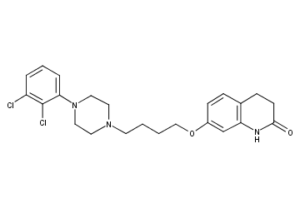Aripiprazole CAS NO 129722-12-9 Inquire about Aripiprazole
Tecoland supplies Aripiprazole bulk active pharmaceutical ingredient (API) to the pharmaceutical industry. Our Aripiprazole is manufactured by cGMP compliant facility. Welcome to contact us for further details including current DMF status for the product and up to date regulatory status of the manufacturing facility. We look forward to assisting you with your research and development projects.
What is Aripiprazole?
Aripiprazole is a partial dopamine agonist of the second generation class of atypical antipsychotics with additional antidepressant properties that is used in the treatment of schizophrenia, bipolar disorder, and clinical depression.
It was approved by the U.S. Food and Drug Administration (FDA) for schizophrenia on November 15, 2002 and the European Medicines Agency on 4 June 2004; for acute manic and mixed episodes associated with bipolar disorder on October 1, 2004; as an adjunct for major depressive disorder on November 20, 2007; and to treat irritability in children with autism on 20 November 2009.
What is the mechanism of action?
Aripiprazole’s antipsychotic activity is likely due to a combination of antagonism at D2 receptors in the mesolimbic pathway and 5HT2A receptors in the frontal cortex. Antagonism at D2 receptors relieves positive symptoms while antagonism at 5HT2A receptors relieves negative symptoms of schizophrenia.
How to dose Aripiprazole?
Aripiprazole usually is taken once a day. The usual starting dose is 10 or 15 mg once daily. The dose may be increased over time to achieve the desired effect. Aripiprazole can be taken with or without food.
What are the side effects?
Some of the most common side effects associated with Aripiprazole are anxiety, blurred vision, constipation, cough, headache, insomnia, lightheadedness, nausea, rash, restlessness, runny nose, sleepiness, tremors, vomiting, weakness, and weight gain. As with other anti-psychotics, long-term use of Aripiprazole may lead to a potentially irreversible condition called tardive dyskinesia (involuntary movements of the jaw, lips, and tongue).
Storage:
Tablets should be stored at room temperature, 15-30 degrees C (59-86 degrees F).
Disclaimer:
Information on this page is provided for general information purposes. You should not make a clinical treatment decision based on information contained in this page without consulting other references including the package insert of the drug, textbooks and where relevant, expert opinion. We cannot be held responsible for any errors you make in administering drugs mentioned on this page, nor for use of any erroneous information contained on this page.